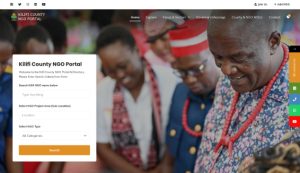Training and Capacity Building Division
The Training and Capacity Building Division is dedicated to enhancing the skills, knowledge, and capabilities of healthcare professionals and support staff in Kilifi County. This division plays a crucial role in ensuring that the workforce is well-equipped to provide high-quality health services and adapt to evolving healthcare needs.
Key Roles
Professional Development Programs
Ongoing Training
The division organizes and facilitates continuous professional development programs for healthcare workers, including doctors, nurses, and allied health professionals. These programs cover a range of topics such as clinical skills, management techniques, and emerging medical technologies.
Specialized Workshops
Targeted workshops and seminars are conducted to address specific needs and advancements in various healthcare fields, ensuring that staff stay updated with the latest practices and guidelines.
Capacity Building Initiatives
Skill Enhancement
Training sessions are designed to enhance the practical skills and technical expertise of healthcare professionals. This includes hands-on training in areas such as emergency response, patient care, and specialized medical procedures.
Leadership Development
Programs aimed at developing leadership and management skills are offered to healthcare administrators and senior staff, focusing on strategic planning, resource management, and effective team leadership.
Certification and Accreditation
Certification Programs
The division supports certification and accreditation processes for healthcare workers, ensuring that they meet national and international standards. This includes facilitating access to certification exams and maintaining records of qualifications.
Quality Assurance
Efforts are made to ensure that training programs align with quality assurance standards and contribute to the overall improvement of healthcare services in the county.
Partnerships and Collaborations
Academic Partnerships
The division collaborates with universities, training institutions, and professional organizations to provide specialized training and certification opportunities. Partnerships with institutions like Thumbay University enhance the scope and quality of training programs.
International Collaborations
Through collaborations with international organizations and agencies, the division gains access to global best practices, advanced training resources, and expertise that benefit the local healthcare workforce.
Training Needs Assessment
Needs Analysis
Regular assessments are conducted to identify training needs and gaps within the healthcare workforce. This ensures that training programs are relevant, targeted, and effective in addressing the specific challenges faced by healthcare professionals.
Feedback Mechanisms
The division uses feedback from healthcare workers and stakeholders to continuously improve training programs and address emerging needs in the healthcare sector.
Capacity Building for Health Systems
System Strengthening
Training and capacity building efforts are focused on strengthening health systems and improving service delivery. This includes training in health information management, quality assurance, and patient safety protocols.
Infrastructure Support
The division supports the development of infrastructure and resources necessary for effective training, including simulation labs, training materials, and technology platforms.
Community Health Education
Training for Community Health Workers
The division provides training for community health workers to improve their skills in delivering health services, educating the public, and managing community health initiatives.
Health Promotion Activities
Training programs are also focused on community health promotion and education, equipping health workers with the tools and knowledge to engage and educate the public on various health issues.
Monitoring and Evaluation
Program Evaluation
The division monitors and evaluates the effectiveness of training programs to ensure they achieve desired outcomes and contribute to improved health service delivery.
Impact Assessment
Regular assessments are conducted to measure the impact of training initiatives on healthcare practices, patient outcomes, and overall service quality.
Resource Development
Training Materials
Development and distribution of training materials, manuals, and resources to support learning and professional development.
E-Learning Platforms
Implementation of e-learning platforms to provide flexible and accessible training options for healthcare workers across the county.
Career Development Support
Career Counseling
The division offers career counseling and guidance to healthcare professionals, helping them to plan their career paths, pursue advanced training, and achieve their professional goals.
Mentorship Programs
Mentorship opportunities are provided to support the professional growth of healthcare workers and enhance their skills through guidance and support from experienced mentors.
Ongoing Initiatives
Expansion of Training Programs
The division is working on expanding the range and scope of training programs to cover emerging healthcare challenges and technological advancements.
Enhanced Collaboration
Strengthening partnerships with academic institutions and international organizations to provide high-quality, specialized training opportunities.
Development of E-Learning Modules
Creating and implementing e-learning modules to facilitate ongoing education and training for healthcare workers in remote areas.
The Training and Capacity Building Division is committed to fostering a skilled and knowledgeable healthcare workforce in Kilifi County. By investing in the professional development of healthcare workers, the division aims to enhance the quality of care, improve health outcomes, and support the overall advancement of the healthcare system.








